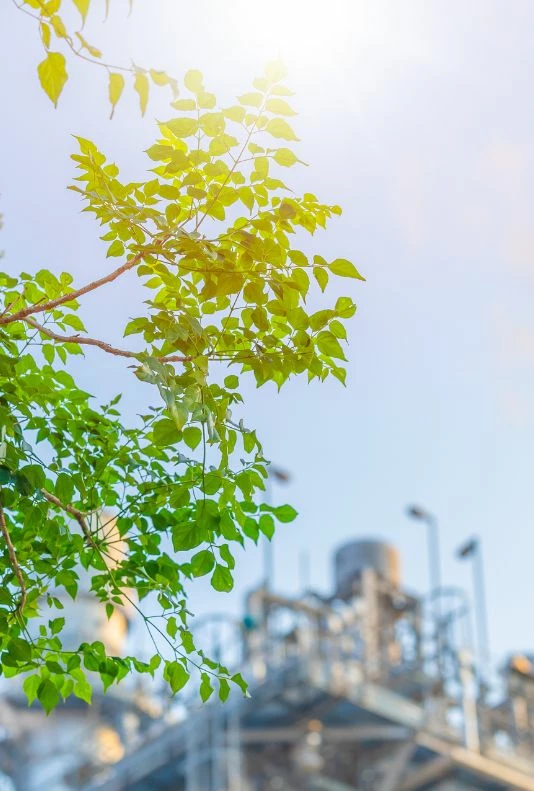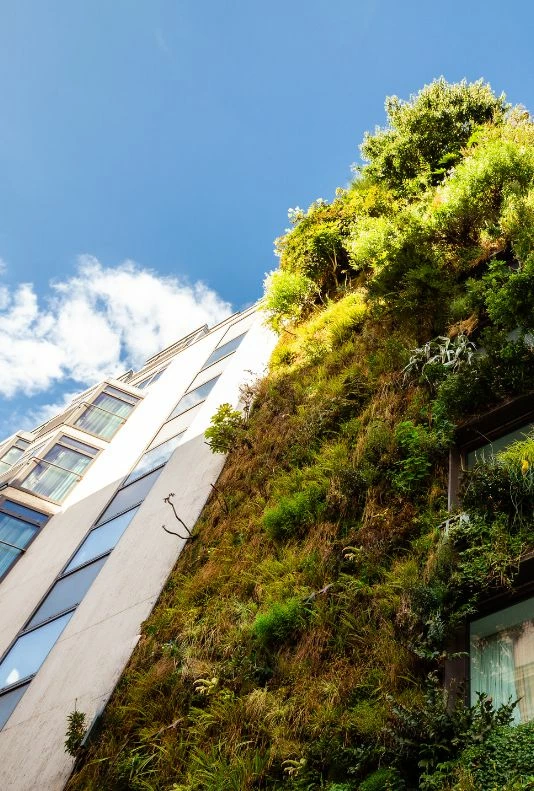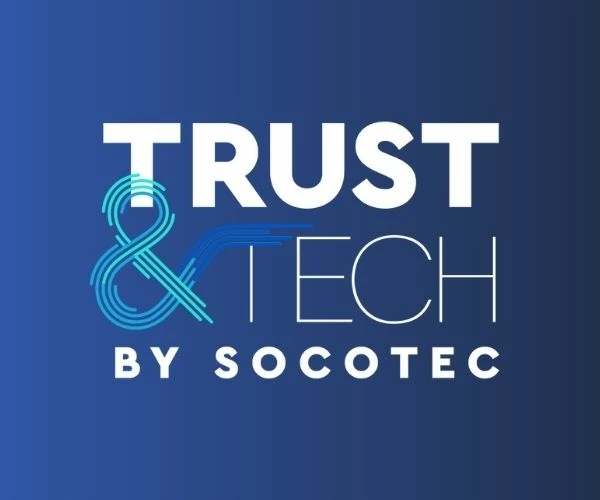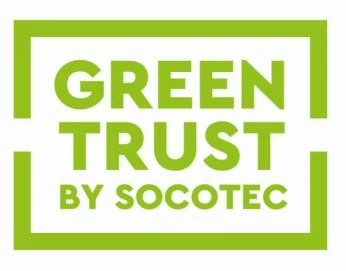Green Trust by SOCOTEC is dedicated to delivering sustainable solutions to our clients, supporting energy and environmental transitions.
Green Trust represents a select group of Testing, Inspection & Certification services which are eligible, under UK/EU standards, or whose environmental impact has been assessed by inter-professional bodies (e.g. TIC Council), as contributing to one or more of the six environmental objectives of the European Taxonomy.
This provides credible framework to assess the sustainability of solutions under Green Trust, reinforcing our commitment to recognised sustainability standards.
By evaluating the percentage of our revenue aligned with these objectives, we can measure the extent of Green Trust activities within our business. In 2024, 39% of SOCOTEC UK revenues resulted from Green Trust activities and we have an ambition to increase this to over 50% by 2028.

What are the six environmental objectives of the European Taxonomy?

Designed to align with the UK's sustainability goals outlined in the Environmental Plan, and the European Taxonomy, our services cover the broader built environment, including infrastructure development and de-carbonised energy installations.

Biodiversity & Health
Environmental Assessments

The result of increased pressure from human activities, resources such as water and aquatic environments, air and soil are subject to a great deal of pollution and degradation that can affect environmental and human health.
Our experts work with you to anticipate health, safety, and environmental risks, offering services such as pollution risk measurement and assessment backed by the latest environmental science and industry standards.
We offer:
- Air quality monitoring and assessment
- Stack emissions monitoring and testing
- Environmental science services – Laboratory analysis including environmental chemistry, advanced chemistry and research, marine, oils, asbestos and water analysis.
- Environmental monitoring and consultancy to minimise environmental impact and ensure compliance with legislation.
- Waste Composition Analysis – To optimise waste disposal routes and develop effective waste reduction strategies.
- Biofuel Testing & inspection – supporting quality low-carbon alternative fuels.
- Contaminated Land Investigation
- Certification solutions such as ISO 14001, ISO 45,001 and ISO 50,001.
- Asbestos Management - Compliance & Safety Services – reducing potential health risks presented to people and workers during demolition & refurbishment and minimising environmental contamination.
In line with the UK's Plan for Water to deliver clean and plentiful water, our teams assess and reduce damaging water abstraction, ensuring compliance with environmental standards. We are well placed to support the reversal of marine biodiversity loss and contribute to securing the wildlife value of its ecosystems.
- Water equipment, products and Legionella risk assessments to ensure a sustainable and safe water supply for your business.
- Water monitoring services to monitor the quality of water (water Framework Directive), e.g. urban pollution management, compliance with permits and consents, contamination studies.
- Marine – Surveying, monitoring and testing
The result of increased pressure from human activities, resources such as water and aquatic environments, air and soil are subject to a great deal of pollution and degradation that can affect environmental and human health.
Our experts work with you to anticipate health, safety, and environmental risks, offering services such as pollution risk measurement and assessment backed by the latest environmental science and industry standards.
We offer:
- Air quality monitoring and assessment
- Stack emissions monitoring and testing
- Environmental science services – Laboratory analysis including environmental chemistry, advanced chemistry and research, marine, oils, asbestos and water analysis.
- Environmental monitoring and consultancy to minimise environmental impact and ensure compliance with legislation.
- Waste Composition Analysis – To optimise waste disposal routes and develop effective waste reduction strategies.
- Biofuel Testing & inspection – supporting quality low-carbon alternative fuels.
- Contaminated Land Investigation
- Certification solutions such as ISO 14001, ISO 45,001 and ISO 50,001.
- Asbestos Management - Compliance & Safety Services – reducing potential health risks presented to people and workers during demolition & refurbishment and minimising environmental contamination.
In line with the UK's Plan for Water to deliver clean and plentiful water, our teams assess and reduce damaging water abstraction, ensuring compliance with environmental standards. We are well placed to support the reversal of marine biodiversity loss and contribute to securing the wildlife value of its ecosystems.
- Water equipment, products and Legionella risk assessments to ensure a sustainable and safe water supply for your business.
- Water monitoring services to monitor the quality of water (water Framework Directive), e.g. urban pollution management, compliance with permits and consents, contamination studies.
- Marine – Surveying, monitoring and testing

Environmental Impact
Energy & Carbon

Energy & Carbon
In line with the UK Net Zero 2050 strategy, SOCOTEC understands the importance of supporting your organisational and renewable project needs to progress the transition towards a low-carbon economy.
We can support with:
- Development of GHG Inventories (Carbon Footprint) – Scopes 1, 2 & 3.
- Development of Carbon Reduction Strategies and Carbon Management Plans (CMPs).
- Energy and carbon reduction audits (Organisational & asset level)
- Energy monitoring and targeting
- Energy Savings Opportunity Scheme (ESOS) Assessments
- Streamlined Energy & Carbon Reporting (SECR) Compliance
- Renewable energy feasibility studies
- Renewable energy analysis, testing and advice
Energy & Carbon
In line with the UK Net Zero 2050 strategy, SOCOTEC understands the importance of supporting your organisational and renewable project needs to progress the transition towards a low-carbon economy.
We can support with:
- Development of GHG Inventories (Carbon Footprint) – Scopes 1, 2 & 3.
- Development of Carbon Reduction Strategies and Carbon Management Plans (CMPs).
- Energy and carbon reduction audits (Organisational & asset level)
- Energy monitoring and targeting
- Energy Savings Opportunity Scheme (ESOS) Assessments
- Streamlined Energy & Carbon Reporting (SECR) Compliance
- Renewable energy feasibility studies
- Renewable energy analysis, testing and advice

Sustainable Real Estate
Construction, Renovation, Refurbishment, Management

Acknowledging the significant environmental impact of the building and real estate sector, we aim to limit this impact by creating efficient and sustainable buildings. We advocate for the use of sustainable building materials and innovative design practices, ensuring your buildings meet environmental standards while positively contributing to their surroundings.
Key areas of sustainable building expertise include:
- Undertake EPCs and provide advice on your improving your building's rating
- Air conditioning (TM44) inspections
- MEES compliance
- BREEAM assessments and consultancy
- Energy monitoring and targeting support
- Energy and carbon reduction audits
- Sustainable building materials testing
- Waste management to support a circular economy
Acknowledging the significant environmental impact of the building and real estate sector, we aim to limit this impact by creating efficient and sustainable buildings. We advocate for the use of sustainable building materials and innovative design practices, ensuring your buildings meet environmental standards while positively contributing to their surroundings.
Key areas of sustainable building expertise include:
- Undertake EPCs and provide advice on your improving your building's rating
- Air conditioning (TM44) inspections
- MEES compliance
- BREEAM assessments and consultancy
- Energy monitoring and targeting support
- Energy and carbon reduction audits
- Sustainable building materials testing
- Waste management to support a circular economy

Sustainable Infrastructure
Rail

In promoting sustainable mobility, we offer expertise covering the entire life cycle of railway structures. From railways to metros and tramways, we support the development of sustainable transportation.
Explore how we can support you and your business:
- Geotechnical Investigation for railways
- Materials Testing for railways
- IoT Monitoring services for railways
In promoting sustainable mobility, we offer expertise covering the entire life cycle of railway structures. From railways to metros and tramways, we support the development of sustainable transportation.
Explore how we can support you and your business:
- Geotechnical Investigation for railways
- Materials Testing for railways
- IoT Monitoring services for railways

Trust & Tech by SOCOTEC
Sustainability through Data and Technology

Our Trust & Tech initiative utilises data and technology to enhance sustainability and energy efficiency. By collecting data through sensors and IoT devices, you can identify and address sources of waste, reducing consumption and minimising environmental impact.
Our team provides sensors and monitoring systems to collect data on energy consumption, equipment performance, and the sustainability of infrastructures and buildings.
We believe in creating a better understanding of sustainability in the built environment. Our experts are dedicated to providing insights, guidance, and transparent information to empower you in making informed decisions that align with sustainable building practices.
Our Trust & Tech initiative utilises data and technology to enhance sustainability and energy efficiency. By collecting data through sensors and IoT devices, you can identify and address sources of waste, reducing consumption and minimising environmental impact.
Our team provides sensors and monitoring systems to collect data on energy consumption, equipment performance, and the sustainability of infrastructures and buildings.
We believe in creating a better understanding of sustainability in the built environment. Our experts are dedicated to providing insights, guidance, and transparent information to empower you in making informed decisions that align with sustainable building practices.
Learn more
What is a sustainable building practice?
Sustainable building services are an integral part of the green building movement, focusing on creating structures that are environmentally responsible and resource-efficient throughout their life-cycle. These services include various stages of a building's life, including planning, design, construction, operation, and even demolition.
The core of these services lies in the application of sustainable construction methods, which include:
- Using renewable and recyclable materials: This contributes to reducing the carbon footprint of the construction process.
- Reducing embodied energy in building materials: Selecting materials that require less energy to produce helps minimise the overall energy consumption.
- Reducing energy consumption of the finished building: This is achieved through energy-efficient design and the integration of low-carbon technologies.
- Protecting natural habitats during and after the construction phase: Sustainable building services ensure that construction activities have minimal impact on surrounding ecosystems.
In the UK, sustainable building services are often centred on retrofit residential de-carbonisation works, which involve upgrading existing buildings to enhance their energy efficiency, reduce their carbon emissions, and improve their overall sustainability. Such services are not only beneficial to the environment but also have significant economic advantages, helping building owners save on energy costs and enhance the value of their properties.
The role of design in sustainable construction
In sustainable construction, design serves as the blueprint for creating environmentally responsible and resource-efficient structures. Effective design strategies include:
- Efficient Space Utilisation: Optimising space usage reduces the need for excess materials and energy, which in turn minimises the environmental footprint of a building.
- User Involvement: Engaging end-users during the design process ensures the finished building not only meets their needs but also performs optimally.
- Preservation of Surrounding Environment: Sustainable design also considers the impact on the surrounding environment, aiming to preserve it as much as possible.
- Resource Conservation and Cost Efficiency: A key aspect of sustainable design is the conservation of resources and enhancement of cost efficiency. This is achieved through the use of sustainable materials and energy-efficient systems, which also contribute to the long-term durability and resilience of the building.
Design is not only about aesthetics but also about functionality and sustainability. Our experts at Green Trust are equipped with the knowledge and skills to deliver design solutions that seamlessly integrate sustainability into every aspect of a building.
Materials considered for sustainable building
The choice of materials significantly influences the sustainability of a building. Apart from traditional materials like wood and stone, many modern, more sustainable alternatives are gaining popularity.
- Bamboo: This rapidly-growing plant can be harvested within four to five years, making it a top choice for sustainable building.
- Recycled Materials: Post-consumer recycled materials such as reclaimed wood and composite frames made from wood shavings and recycled plastics are also extensively used.
- Cob: A mixture of clay-based soil, water, straw, and occasionally sand, is an ancient, still-used material for creating walls and floors.
Materials like bendable concrete and vinyl provide budget-friendly and efficient options. While concrete is praised for its longevity and thermal stability, the high carbon emissions during its production call for greener alternatives.
The use of these materials not only reduces the environmental impact but also enhances the healthiness of the living environments.
What are the sustainable building maintenance practices?
Building maintenance is crucial to the longevity and efficiency of a structure. Implementing sustainable practices in this area involves a series of strategies designed to minimise environmental impact and optimise resources. Waste management is an essential part of a building's operation and maintenance plan, involving a comprehensive audit of the type and amount of waste produced.
The use of advanced technology, such as IoT devices and smart sensors, allows for continuous monitoring and control of systems, aiding in the identification of potential areas for energy usage improvement.
Another key aspect is the focus on health and safety, ensuring the well-being of building occupants while also promoting the reuse and recycling of building components.

Introduction to Green Trust Solutions by Paul Jones
Want to find out more about our Green Trust solutions?
For more information about Green Trust by our experts, please feel free to get in touch. We're here to support your journey towards a more sustainable future.









